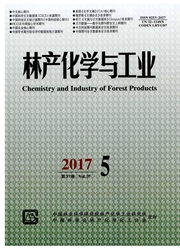

 中文摘要:
中文摘要:
以浸渍法将纳米金属Pd粒子负载到介孔纯硅分子筛MCM-41中,制得Pd/MCM-41催化剂。采用X射线衍射仪(XRD)和电子显微镜(TEM)对所合成的材料进行了表征。结果表明,纳米Pd已经成功引入到MCM-41分子筛中。并均匀分布在分子筛的孔道内,分子筛仍然保持良好的中孔结构。将Pd/MCM-41用来催化松香加氢反应,实验结果表明,Pd/MCM-41的催化活性和选择性均优于Ni/MCM-41和Pd/C。同时详细考察了反应时间、温度、氢气压力和催化剂用量等因素对反应的影响,得到了较佳的反应条件:松香与催化剂的质量比为1:0.04(松香5g,催化剂0.2g),反应温度180℃,氢气压力8MPa,反应时间4h,制得的氢化松香产品中枞酸质量分数1、0%,去氢枞酸质量分数9.3%。
 英文摘要:
英文摘要:
Nanometer metal particle Pd was loaded into the holes of the mesoporous molecular sieve MCM-41 by impregnation. Pd/MCM-41 mesoporous molecular sieve is characterized by means of XRD and TEM. The results indicate that nanometer metal particle Pd was uniformly loaded into mesoporous sieve successfully, and the mesoporous sieve still keeps its mesoporous characters. The Pd/MCM-41 catalyst has better catalytic activity and selectivity than Ni/MCM-41 and Pd/C. Factors affecting hydrogenation of rosin such as reaction time, temperature, hydrogen pressure and the dosage of catalyst were studied, and the components were analyzed with gas chromatography. The results showed that the optimum reaction condition is: mass ratio of rosin to catalyst 1 : 0.04 ( rosin 5 g, catalyst 0.2 g) reaction temperature 180 ℃, pressure 8 MPa, reaction time 4 h. Under this condition the content of hydrogenated part in the product is 89.7 % , which proved that this mesoporous molecular sieve Pd/MCM-41 has good activity.
 同期刊论文项目
同期刊论文项目
 同项目期刊论文
同项目期刊论文
 期刊信息
期刊信息
